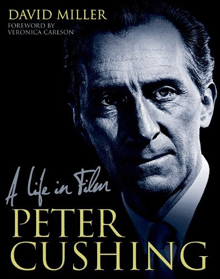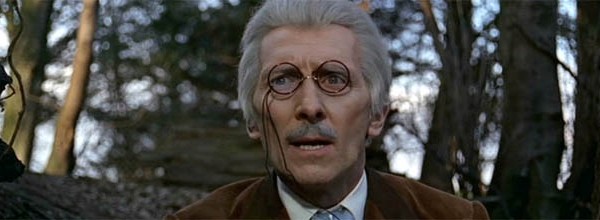For those slightly older, or who have enjoyed the films on wet Bank Holiday mornings, he was Dr Who. Not the time-travelling alien hero of the BBC, but a far more human fellow who had knocked up a TARDIS in his back garden and proceeded to have a couple of big screen encounters with the Daleks in glorious Technicolor.
Then, of course, there are the Hammer films. In the British film company’s heyday he regularly starred as both the troubled genius Dr Frankenstein and the vampire hunter Abraham Van Helsing, often pitted against Christopher Lee’s recurrent blood-sucking monstrosity, Dracula.
 Peter Cushing: A Life in Film is a tribute to all these iconic roles and much more besides. Beginning with his childhood, the book chronicles the story of a man always destined for the stage. Although he started his working life as a surveyor’s assistant for the local council, Cushing was soon on the right path, learning to conquer his South London accent with vocal exercises and showing dogged persistence to get his break.
Peter Cushing: A Life in Film is a tribute to all these iconic roles and much more besides. Beginning with his childhood, the book chronicles the story of a man always destined for the stage. Although he started his working life as a surveyor’s assistant for the local council, Cushing was soon on the right path, learning to conquer his South London accent with vocal exercises and showing dogged persistence to get his break.
Success on the stage led to Hollywood and he headed stateside in 1939. After some minor roles, including a part in Laurel and Hardy’s A Chump at Oxford, war interrupted and he returned to enlist in 1941, ending up performing for the troops as a member of the Entertainment National Services Association when he was turned down for active service.
The book reveals that Cushing had a much broader career than those roles for which he is principally remembered. We were surprised to discover that he had done so much television work, sadly much of it before the advent of recording technology. At one point, around the time of the launch of commercial television, Cushing was under contract to the BBC and viewed as one of their biggest stars.
An early example of television success was his starring role as Winston Smith in the 1954 production of Orwell’s Nineteen Eighty-Four, which was adapted for the small screen by Nigel Kneale. The production provoked a tremendous reaction with questions even being asked in Parliament.
He was a great collaborator and generally careful about the quality of his scripts, often rewriting or providing substantial input into his roles. Sadly, his chosen career appears not to have sat well with family though; in financially tough times when seeking a loan from his father he was crushingly told that he was “… nearly 40… and a failure.”
Away from screen and stage, we learned some interesting snippets of the man himself. Despite being a gentle soul, Cushing was obsessed with his collection of toy soldiers, often appearing on radio and television to talk about them. Clearly devoted to his wife Helen, he was heartbroken when she died in early 1971.
Cushing enjoyed an amazing roster of co-stars in his 60-year career, working with names as diverse as Sir Laurence Oliver and Bernard Cribbins, as well as cult favourites such as Patrick Macnee and Patrick Troughton. The book is utterly filled with anecdotes of Cushing’s generous nature and his enthusiasm.
This is a very comprehensive piece of work detailing each production in turn, revised and re-released to coincide with the centenary of the actor’s birth. There is a chronology provided which covers stage, screen and television appearances, along with comprehensive notes and indexing.
While possibly aimed more towards the hard-core enthusiast, David Miller’s book is both a fascinating read and a great reference tome. Filled with many superb photos, some posed and some more candid, it provides a real insight into both the man and his impressive body of work.
![]()
Published on Friday 19 April 2013 by Titan Books.
> Order Series 7 Part 2 on DVD on Amazon.
What did you think of the book? Let us know below…

